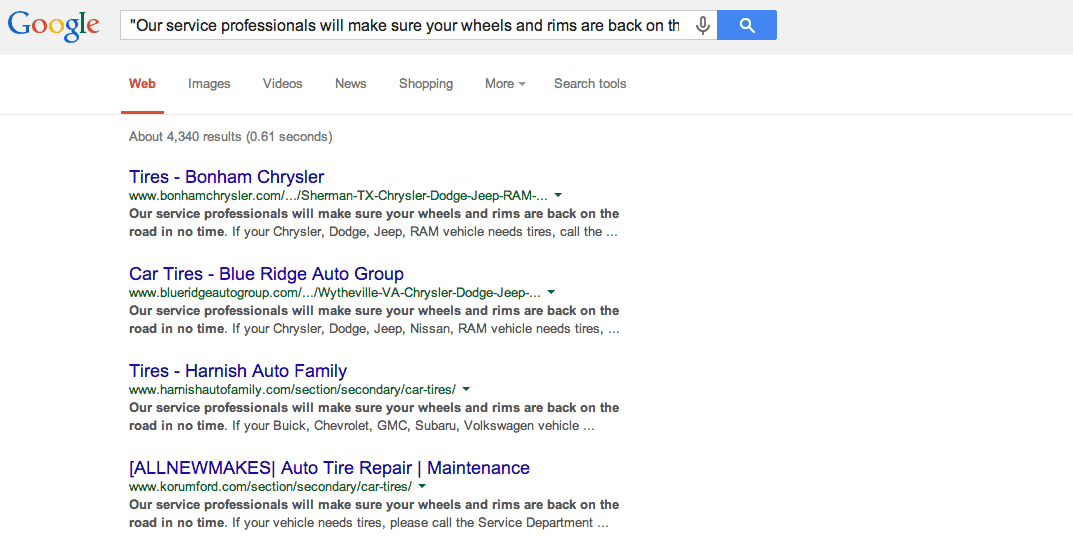Dealers, there’s something fishy going on with the major automotive website providers. Problems that affect search results are popping up left and right, but no one is willing to accept responsibility and fix the issues. Instead, there’s a brick wall of “Aw shucks, that’s the way things are. Guess you’ll have to deal with it.”
And I know what you’re thinking, but these are not isolated events with one rotten website provider. These issues are occurring with almost all providers in the industry.
I’m going to share a couple of my recent experiences, and I want to hear about the issues that your companies and dealers have faced when asking providers to fix problems with their systems.
Example #1: Shifting Blame and Unaware Managers
After a dealership came to Wikimotive with rapidly decreasing traffic, we did an aggressive audit of their site and discovered a number of red flags that could be causing issues with Google.
But as we took these issues directly to the provider, we were told the pages that were raising the red flags were created by someone at the dealership or a third party. However, with a simple Google search, we were able to discover that to be entirely untrue. Because if someone had written that content exclusively, we wouldn’t have a problem with it in the first place. This, on the other hand, is a big problem:
The response to this, and another inquiry regarding duplicate content from the provider’s SEO MANAGER, was essentially, “Yeah, there’s some duplicate content, but until Google says that’s a problem, we’re not willing to change.”
Um, pretty sure they’ve said it before. And every professional SEO company agrees that small changes, such as location–which is standard practice for many website providers–can still cause a page to be labeled a duplicate in Google’s eyes.
Specifically, Moz advises site owners to steer clear of this type of activity:
“Duplicate content anywhere on your site, but especially on city landing pages. Yes this includes recycling a few keywords here and there to make it look different. You can get away with this for a while, but odds are, Google will catch you and it won’t be fun.”
What kind of business admits having issues to a client and then refuses to look into a solution? The kind that thinks that it’s in the position of power, as opposed to the paying customer.
Are you mad yet?
You should be! Because until you go through and audit your site or any of your clients’ sites, you don’t know the full extent of the damages.
Think about it like this: If you were building a house and a building inspector told you there were multiple code violations you needed to fix before construction could continue, what would you expect your contractor to say? Probably that they’d fix the issues immediately, and for free of charge, right? Of course! That’s the job you paid them to do, and they messed up! But, what would you do if instead of offering to fix things, they blamed you and fought with the building inspector on the existence of building codes.
That’s what we’re dealing with here, people.
Example #2: Consistent Ball Dropping
When you can actually get a provider to agree to fix something, you come up against an entirely different set of problems. Because if there’s one thing automotive website providers are good at, it’s dragging their feet and leaving a job half-done.
Now, we all can appreciate what it’s like to run a business–and software that powers hundreds, sometimes thousands of websites is no doubt extremely complicated–but when things seem to consistently be delayed months at a time, something’s got to give.
No, seriously. It’s that bad.
We gave a time-sensitive job to one provider in order to clean up a newer client’s website. The client came to us after discovering a manual web spam penalty by Google, entrusting us to help them work through the issue. Here’s the list we gave our new client’s provider:
- 259 pages to be deleted
- Redirect or fix a number of duplicate pages (which they duplicate by default, I might add)
- Make certain sitemap is compliant with Google’s guidelines
And here’s what was “completed” about two months later:
- 24 pages disallowed in robots.txt — which does not have the desired effect
- 235 untouched, yet-to-be-deleted pages
- No redirects or fixes to duplicate pages
- Sitemap still not compliant with Google
What happened?
They assured us multiple times throughout those two months that they were “working” on the issues. But what we really got was a bunch of talk to get us to shut up and go away.
Imagine you bring your car to a dealership to fix an issue and you end up having to leave it overnight. The next morning you call to get a status update and they tell you they’re working on it. Not unreasonable, they could be really busy. But what happens if it’s not done the next day or the day after that? You start getting really pissed off!
I mean, really: Calling your provider regularly for two months and getting nothing but “We’re working on it, okay” is anything but okay! We all know that dealerships can’t get away with this type of crappy support and service, so why do the businesses that assist us get away with it time and time again?
Where’s the Outrage?
These are only a couple of examples of the major incompetency that runs rampant at many of the major automotive website providers. In researching similar issues for this blog post, I came across many instances in which dealer website managers dealt with some of the most mind-blowing issues.
The most ridiculous story was from an internet manager who had a list of issues with a particular website provider. The one that stands out the most, though, was the fact that this provider had listed the wrong “Contact Us” number when they originally set the site up.
Don’t worry, it gets worse.
It would be somewhat understandable if someone accidentally entered a wrong digit–and instead of getting their dealership you got the pizza place across town–but the provider had entered the number for a completely different dealership onto their site.
Yes, it gets even worse than that.
It took five requests and three months for the provider to make ONE LITTLE FIX. So for three months, visitors for their site were greeted by another dealership, which means leads and revenue were flushed down the toilet thanks to a provider that doesn’t hold itself accountable.
If that had happened on my watch, heads would have rolled.
Start Holding Providers Accountable
So what’s the problem here? After dealing with an SEO Manager who doesn’t think duplicate content is an issue and issues that never get resolved, I’ve come to the conclusion that website providers in the automotive industry simply aren’t used to being held accountable, and it’s time that changed.
What does this mean for me as a dealer or manager?
If you haven’t already directly dealt with issues getting your provider to do things right, it’s likely you’re either lucky or your site has yet to be audited in order to uncover the problems plaguing most dealership websites.
With a site audit, you’ll gain a better understanding of how website providers are giving you a product that is doing harm to your search engine authority, as well as overall business, the second it goes live.
Wikimotive is proud to offer free site audits to any dealership facing issues with their current provider or dealing with a continuous decrease in monthly traffic. We want to help dealers fix their sites by giving them a solid list of issues to take to their provider to be fixed or advise them to find a better website provider.

